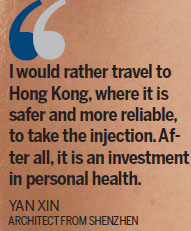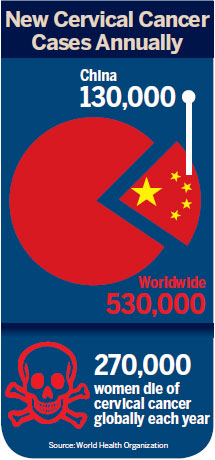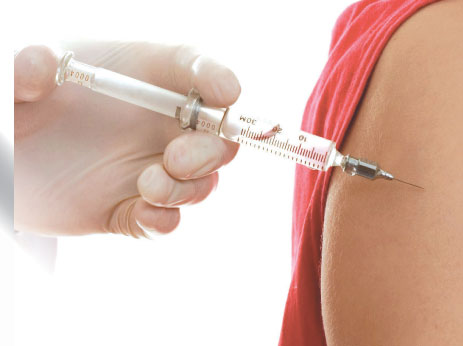A well-timed shot
Updated: 2014-11-20 08:59
By Zhou Mo(HK Edition)
|
|||||||||
Even as more women from the mainland arrive in Hong Kong to get vaccinated against the HPV - the likely cause of cervical cancer - the city's residents don't seem too eager to take advantage of the locally available service. A report by Zhou Mo.
Yan Xin cannot count her trips to Hong Kong to buy costumes and cosmetics. But earlier this year the 25-year-old Shenzhen-based architect crossed the border to keep an appointment at a private medical clinic. She was about to begin a series of vaccinations against HPV (human papillomavirus), which might save her life.
HPV is a common virus. There are more than 100 variants. Most are harmless. Some, however, can cause cancer, cervical cancer, especially. The vaccine Yan was to receive isn't available on the mainland. That's why she came to Hong Kong.
The topic of HPV and its close connection to cervical cancer has been circulating among young women. Yan had talked about it with her friends until finally she made up her mind to do what was needed to safeguard her health.
"It is necessary to protect myself. I need to take responsibility for my own body," said Yan, who took her last injection at a clinic in Tsim Sha Tsui in July.
Yan became one of many mainland women coming across the border in recent years seeking the HPV vaccine. The numbers are growing. Some arrive in groups. A physician at a clinic in Mong Kok said two thirds of those receiving vaccinations are from the mainland.
Since 2006, when widespread use of HPV vaccine began, it has been used widely in more than 100 countries and regions, including Hong Kong. On the Chinese mainland, however, the vaccine remains in clinical trials and has not been given approval for general use from regulators.
The demand for HPV vaccinations and slow regulatory approval has given rise to a black market on the mainland. Some private hospitals and clinics in Shenzhen advertise on their websites that their vaccines are imported from the US and are completely safe. A physician surnamed Ding at Shenzhen Home Women's and Children's Hospital said her hospital administers two to three injections a day, on average.
"There are quite a few clinics in Shenzhen providing HPV vaccination service," Yan said. "It's more convenient for me to get it done away from home. However, I'd rather travel to Hong Kong to take the injection, where it is safer and more reliable. After all, it is an investment in personal health."
HPV vaccine does not heal cervical cancer but is said to provide protection for 10 years, from two high-risk strains, HPV16 and HPV18, blamed for causing 70 percent of cervical cancers and precancerous cervical lesions.
Few takers in HK
Although HPV vaccination has become a trend in some parts of the Chinese mainland, women in Hong Kong have shown no sense of urgency in obtaining the vaccine. Only about 10 percent of Hong Kong women are estimated to have received the anti-HPV injection as of the end of 2013. Hextan Ngan Yuen-sheung, professor and chief of service at the Department of Obstetrics and Gynecology at the University of Hong Kong-Shenzhen Hospital, said "lack of recognition and relatively high cost are the two main reasons for the low rate".
HPV vaccination requires three injections over six months at a cost of between HK$2,700 ($348) and HK$3,600. Despite the relatively high cost, the vaccination remains the "primary prevention" against cervical cancer, and women in many countries are highly encouraged to have themselves vaccinated. The British and Australian governments offer free HPV vaccination to reduce cervical cancer. The Hong Kong government offers no subsidy to encourage women to receive the vaccination.
Ngan said although some international schools in Hong Kong provide HPV vaccination service for students, the procedures are not free. "We hope the Hong Kong government will take some action in this regard," she said.
HPV is transmitted from person to person, mainly through sexual contact. It's a serious concern. The World Health Organization reports that more than 270,000 women die from cervical cancer every year, making the disease the second-most common cause of death due to cancer among women - breast cancer still leads the list. In Hong Kong, cervical cancer is the ninth-most common cause of cancer deaths, down from fourth place 20 years ago. In 2012, 133 women died of the disease.
Annie Cheung Nga-yin, professor and chief of service at the Department of Pathology at the University of Hong Kong-Shenzhen Hospital, said the decline of the mortality rate in Hong Kong can be attributed to cervical cancer screening, which she described as the "secondary prevention" against the disease. Although HPV vaccination is not widely sought by Hong Kong women, most have undergone the screening.
"In the 1960s, few people had knowledge of cervical cancer. At that time the screening service was provided by maternal and child health centers. Pregnant women coming for inspection were encouraged to take the test and gradually the number of women taking the test increased," Cheung said.
According to a 2011 study jointly conducted by the University of Hong Kong, the Family Planning Association of Hong Kong and Sun Yat-sen Memorial Hospital in Guangzhou, 84 percent of Hong Kong women have taken a pap test, which helps detect abnormal cells on the cervix caused by HPV. By comparison, the percentage is only 31 percent in Guangzhou.
"HPV vaccination and cervical cancer screening are different levels of prevention," Cheung said. "HPV vaccine provides primary prevention and screening acts as a second bulwark against the disease. Both can play an active role in preventing and controlling cervical cancer."
The statistical breakdown arouses even greater concern on the mainland, which reports 130,000 new cases of cervical cancer every year. That's 25 percent of the annual total of 530,000 cases globally.
Cheung said though the number of mainland women injecting HPV vaccine is climbing, general awareness of cervical cancer prevention is still low. "Mainland females should increase their vigilance against the disease and, most importantly, take the first step to take cervical cancer screening," Cheung said.
Contact the writer at sally@chinadailyhk.com

|
Despite local celebrities, like Charlene Choi and Ekin Cheng, lending their faces to the HPV vaccination campaign, Hong Kong people are yet to warm up to the idea in a big way. Provided to China Daily |



(HK Edition 11/20/2014 page7)
